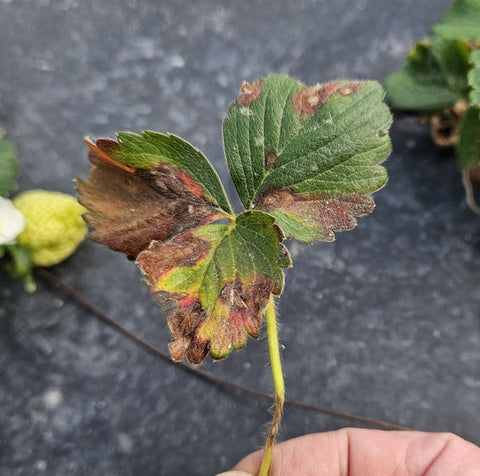The strawberry propagation industry is currently navigating a challenging period due to the outbreak of Neopestalotiopsis (Neo-P), a fungal disease that has recently emerged as a significant concern. We are laser-focused on working together as an industry to understand the challenges ahead and collaboratively take action in the face of this troublesome situation.
Understanding Neo-P: What You Need to Know
Neopestalotiopsis is a fungal pathogen that has gained attention due to its rapid spread in certain regions. It thrives in warm, humid conditions, which are common in strawberry propagation environments, making it particularly challenging to manage. Researchers and extension specialists from institutions like the University of Georgia and NC State have been actively studying the disease, providing valuable insights into its impact and management.

Pictured above: Close-up of Neopestalotiopsis leaf symptoms. Photo Credit: Bill Cline
WHAT WE’VE LEARNED SO FAR:
- Neo-P’s spread is facilitated by water, with tropical storms aiding in long-distance movement and human activity contributing significantly to its spread.
- There is no evidence for airborne conidia.
- Neo-P thrives between 60–78°F, with increased severity in prolonged wet conditions.
- The severity of the disease is directly related to the environmental conditions. The fungus spreads rapidly with rainstorms, and the disease is particularly favored by prolonged wetness following rain.
- Under optimum conditions of wetness and temperature, new symptoms are observed as soon as five days. Thus, many cycles of the disease can occur during wet seasons with multiple rain events.

Pictured above: Neopestalotiopsis crown infection showing characteristic reddening of leaves, wilt, and stunting of new growth. Photo Credit: Bill Cline
THE GOOD NEWS:
- The strawberry industry is moving swiftly and uniting to understand and combat Neo-P.
- Dr. Marcus V. Marin, University of Florida, is seeking funding for a research proposal titled “Unraveling the Emergence of Aggressive Neopestalotiopsis Lineages on Strawberry.”
- Dr. Natalia Peres, Gulf Coast Research and Education Center, is requesting funding from the USDA-AFRI-CARE program on an investigation, Strategic Intervention to Suppress Severity and Spread of Emergent Neopestalotiopsis in Strawberry Production Systems.
- Industry members are actively supporting growers and providing tools to manage the disease.

Ongoing Education and Support
Flavorfirst has had boots on the ground, literally, since the news of Neo-P hit. They’re in the fields and proactively speaking to various industry experts to provide us with frequent, helpful updates. We strongly recommend reviewing the information that has been shared to date.
We also recommend that you stay informed about latest developments in disease management. The NC State University Strawberry Breeding Program has conducted extensive trials on various cultivars, and this data can be a valuable resource when making decisions about plant selection and disease resistance.
How We Are Mitigating Risks
Last year, Nourse Farms invested in innovative propagation techniques that mitigate risks while enhancing overall plant quality. We recognize the importance of providing our customers with plants that are not only healthy but also free from the risks associated with diseases like Neo-P. Our stringent quality control processes are designed to ensure our plants are in the best position to meet the highest standards of cleanliness and health. From propagating mother plants from tissue culture to regular testing to developing machine grading equipment, we are dedicated to supporting you, our loyal customers, by providing the best possible plants and the information to succeed. This controlled approach helps reduce the risk of disease, allowing your crops to establish successfully and thrive throughout the growing season.
Rigorous Disease Management: Essential Steps
It’s essential for all strawberry growers to be vigilant and proactive in protecting their crops. We recommend implementing a comprehensive disease management plan that includes regular monitoring and timely application of fungicides. Ensure that your spray equipment is in excellent working condition and that you have the necessary resources to maintain a consistent spray schedule throughout the growing season.
Working Together for Healthy Crops
As the strawberry industry faces the challenges posed by Neo-P, it is more important than ever to work together and share knowledge. By staying informed and taking proactive measures, we can continue to grow healthy, productive strawberry crops.
We are here to support you through this season and beyond. Should you have any questions or need assistance, please do not hesitate to reach out to our team by calling 413-665-2658 or emailing info@noursefarms.com. Together, we can ensure that your plants remain healthy and productive, even in the face of new challenges.
Resources
Neopestalotiopsis Disease Management Update
Flavorfirst Neo-P Updates
This article is from the 2025 Fall Commercial Newsletter.



